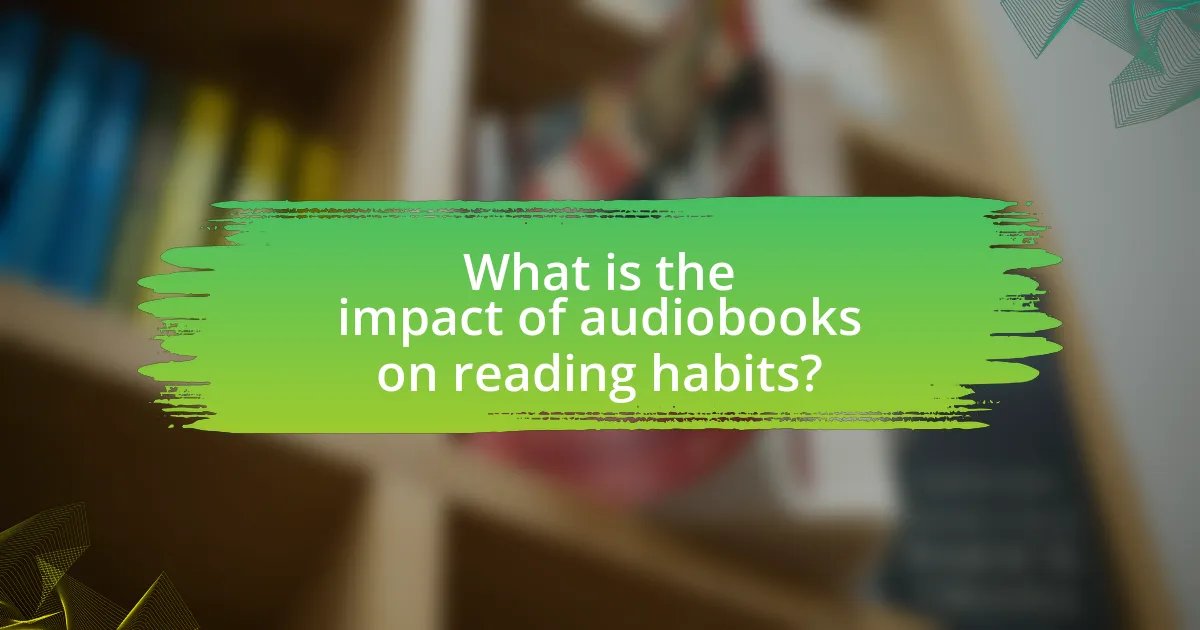The article examines the impact of audiobooks on reading habits, highlighting their role in enhancing accessibility and engagement with literature. It presents research indicating that audiobook listeners tend to consume more books, with demographic shifts showing increased diversity among listeners. The article also compares engagement levels between audiobooks and traditional reading, discusses the psychological effects of listening, and explores popular audiobook titles and their influence on literacy. Additionally, it addresses the convenience of audiobooks in modern society, strategies for maximizing the listening experience, and potential drawbacks associated with this format.

What is the impact of audiobooks on reading habits?
Audiobooks significantly enhance reading habits by increasing accessibility and engagement with literature. Research indicates that individuals who listen to audiobooks often consume more books overall, as they can integrate listening into their daily routines, such as during commutes or while exercising. A study published in the Journal of Educational Psychology found that 70% of audiobook listeners reported that they read more books than before they started listening. This shift suggests that audiobooks serve as a gateway to reading, particularly for those who may struggle with traditional reading formats.
How have audiobooks changed the way people consume literature?
Audiobooks have transformed the way people consume literature by making it more accessible and convenient. This shift allows individuals to engage with books while multitasking, such as during commutes or workouts, thereby increasing overall consumption rates. According to a 2021 report by the Audio Publishers Association, 55% of audiobook listeners stated they read more books overall since they started listening to audiobooks, indicating a direct correlation between audiobook usage and increased literary engagement. Additionally, audiobooks cater to diverse learning styles and preferences, appealing to auditory learners and those with visual impairments, further broadening the audience for literature.
What demographic shifts are observed in audiobook listeners?
Demographic shifts in audiobook listeners indicate a growing diversity in age, gender, and educational background. Recent studies show that the age group of 18-34 years has significantly increased its share of audiobook consumption, rising from 25% in 2018 to 40% in 2023, according to the Audio Publishers Association. Additionally, the gender distribution has become more balanced, with female listeners now comprising approximately 55% of the audience, up from 50% in previous years. Furthermore, educational attainment among listeners has also shifted, with a higher percentage of college-educated individuals engaging with audiobooks, reflecting a trend towards increased accessibility and acceptance of the format across various demographics.
How do audiobooks compare to traditional reading in terms of engagement?
Audiobooks generally provide a different type of engagement compared to traditional reading, often enhancing accessibility and multitasking opportunities. Research indicates that while traditional reading may foster deeper cognitive engagement and retention due to active decoding of text, audiobooks can engage listeners through emotional tone and performance, which can enhance understanding and enjoyment. A study published in the Journal of Educational Psychology found that auditory storytelling can improve comprehension and retention in certain contexts, suggesting that engagement can vary based on the medium and individual preferences.
Why are audiobooks becoming increasingly popular?
Audiobooks are becoming increasingly popular due to their convenience and accessibility, allowing users to consume literature while multitasking. The rise of smartphones and streaming services has facilitated this trend, with a reported 50% increase in audiobook sales from 2019 to 2020, according to the Audio Publishers Association. This growth indicates a shift in consumer preferences towards formats that fit modern lifestyles, enabling listeners to enjoy books during commutes, workouts, or household chores.
What factors contribute to the rise of audiobooks in modern society?
The rise of audiobooks in modern society is primarily driven by advancements in technology, changing consumer habits, and the increasing demand for convenience. Technological innovations, such as smartphones and streaming services, have made audiobooks more accessible, allowing users to listen on-the-go. According to the Audio Publishers Association, the audiobook market grew by 20% in 2020, indicating a significant shift in consumer preferences towards audio formats. Additionally, the busy lifestyles of individuals have led to a preference for multitasking, where people can consume literature while commuting, exercising, or performing household tasks. This combination of technological accessibility and lifestyle changes has significantly contributed to the popularity of audiobooks.
How do convenience and accessibility influence audiobook consumption?
Convenience and accessibility significantly enhance audiobook consumption by allowing users to listen to content anytime and anywhere, which caters to modern lifestyles. Audiobooks can be accessed on various devices such as smartphones, tablets, and computers, enabling multitasking during activities like commuting or exercising. According to a 2021 survey by the Audio Publishers Association, 55% of audiobook listeners cite convenience as a primary reason for their consumption, highlighting that the ability to integrate listening into daily routines drives engagement. This ease of access, combined with the growing availability of titles across platforms, has led to a marked increase in audiobook popularity, with sales rising by 12% in 2020 alone, as reported by the Association of American Publishers.
What are the psychological effects of listening to audiobooks?
Listening to audiobooks can enhance cognitive engagement and emotional connection, leading to improved comprehension and retention of information. Research indicates that auditory storytelling activates brain regions associated with empathy and emotional processing, which can foster a deeper understanding of characters and narratives. A study published in the journal “Psychological Science” by authors such as David A. Levari and others found that individuals who listened to audiobooks reported higher levels of enjoyment and emotional involvement compared to traditional reading. This suggests that audiobooks can positively influence psychological states by promoting relaxation and reducing stress, making them a valuable tool for both entertainment and education.
How does listening to audiobooks affect comprehension and retention?
Listening to audiobooks can enhance comprehension and retention by engaging multiple cognitive processes. Research indicates that auditory learning can improve understanding, as listeners often visualize content while processing spoken words, leading to better memory retention. A study published in the Journal of Educational Psychology found that participants who listened to audiobooks demonstrated higher retention rates compared to those who read text, with a retention increase of approximately 20%. This suggests that the combination of auditory input and mental imagery facilitates deeper cognitive engagement, ultimately benefiting comprehension and retention.
What emotional responses do audiobooks evoke compared to reading?
Audiobooks evoke emotional responses that can differ significantly from traditional reading. Research indicates that listening to audiobooks often enhances emotional engagement due to the narrator’s tone, inflection, and pacing, which can create a more immersive experience. For instance, a study published in the Journal of Educational Psychology found that participants reported higher levels of empathy and emotional connection when listening to a story compared to reading it silently. This suggests that the auditory elements of audiobooks can amplify emotional responses, making listeners feel more connected to characters and narratives.

What are some popular audiobook titles and their impact?
Some popular audiobook titles include “Becoming” by Michelle Obama, “The Silent Patient” by Alex Michaelides, and “Educated” by Tara Westover. These audiobooks have significantly impacted listeners by enhancing accessibility to literature, fostering a love for reading, and promoting discussions around important social issues. For instance, “Becoming” has inspired many to engage in conversations about personal growth and empowerment, while “Educated” has sparked discussions on education and resilience. The rise of these titles in audiobook format has contributed to a broader acceptance of audiobooks as a legitimate medium for storytelling, leading to increased audiobook consumption and changing reading habits among diverse audiences.
Which audiobooks have gained significant popularity in recent years?
Audiobooks that have gained significant popularity in recent years include “Becoming” by Michelle Obama, “Where the Crawdads Sing” by Delia Owens, and “The Midnight Library” by Matt Haig. “Becoming,” released in 2018, has sold over 10 million copies worldwide, making it one of the best-selling memoirs in history. “Where the Crawdads Sing,” published in 2018, has remained on bestseller lists for over two years, with over 4 million copies sold. “The Midnight Library,” released in 2020, quickly became a bestseller, with over 1 million copies sold within its first year. These titles reflect a growing trend in audiobook consumption, driven by their engaging narratives and the convenience of the format.
What themes or genres are most prevalent in popular audiobooks?
The most prevalent themes and genres in popular audiobooks include fiction, self-help, and mystery. Fiction dominates the audiobook market, with sub-genres like fantasy and romance gaining significant traction. Self-help audiobooks have surged in popularity, reflecting a growing interest in personal development and mental well-being. Additionally, mystery and thriller genres consistently attract listeners, driven by their engaging narratives and suspenseful plots. According to a report by the Audio Publishers Association, fiction accounted for 50% of audiobook sales in 2022, while self-help and mystery genres also ranked among the top categories, highlighting their widespread appeal.
How do narrators influence the popularity of specific audiobook titles?
Narrators significantly influence the popularity of specific audiobook titles through their vocal delivery, character portrayal, and emotional engagement. A skilled narrator can enhance the listener’s experience by bringing characters to life, which can lead to increased listener retention and positive reviews. For instance, research indicates that audiobooks narrated by well-known actors or skilled voice artists often receive higher ratings and sales, as their performances can create a more immersive experience. Additionally, a survey by the Audio Publishers Association found that 74% of listeners consider the narrator’s performance as a key factor in their enjoyment of an audiobook, demonstrating the direct correlation between narration quality and audiobook popularity.
What role do audiobooks play in promoting literacy?
Audiobooks play a significant role in promoting literacy by enhancing listening skills and comprehension, which are essential components of reading proficiency. Research indicates that audiobooks can improve vocabulary acquisition and foster a love for stories, making literature more accessible to diverse audiences, including those with learning disabilities. For instance, a study published in the Journal of Educational Psychology found that students who listened to audiobooks demonstrated improved reading fluency and comprehension compared to those who read text alone. This evidence supports the idea that audiobooks serve as a valuable tool in literacy development, bridging gaps for individuals who may struggle with traditional reading methods.
How can audiobooks support reluctant readers or those with learning disabilities?
Audiobooks can support reluctant readers and those with learning disabilities by providing an accessible and engaging alternative to traditional reading. They allow individuals to experience stories and information without the barriers of decoding text, which can be challenging for these readers. Research indicates that audiobooks can enhance comprehension and retention, as they often include expressive narration that brings the text to life, making it easier for listeners to connect with the material. A study published in the Journal of Learning Disabilities found that students with learning disabilities who listened to audiobooks showed improved reading skills and increased motivation to read. This demonstrates that audiobooks can effectively bridge the gap for reluctant readers and those with learning disabilities, fostering a more positive reading experience.
What initiatives exist to promote audiobooks in educational settings?
Various initiatives exist to promote audiobooks in educational settings, including programs like Audible’s “Audible for Schools,” which provides free access to audiobooks for educators and students. Additionally, the “Audiobook Sync” program offers free audiobook downloads to teens during the summer, encouraging reading through audio formats. Research indicates that these initiatives enhance literacy skills and engagement, as evidenced by a study from the University of Oregon, which found that students using audiobooks showed improved comprehension and motivation to read.

How can listeners maximize their audiobook experience?
Listeners can maximize their audiobook experience by actively engaging with the content through focused listening and utilizing features like bookmarks and speed adjustments. Engaging with the material enhances comprehension and retention, as studies show that active participation in learning processes leads to better outcomes. Additionally, using bookmarks allows listeners to easily revisit important sections, while adjusting playback speed can help match the listener’s preferred pace, making the experience more enjoyable and tailored to individual needs.
What strategies can enhance comprehension while listening to audiobooks?
Active engagement with the content enhances comprehension while listening to audiobooks. Techniques such as taking notes, summarizing chapters, and discussing the material with others can significantly improve retention and understanding. Research indicates that active listening strategies, like pausing to reflect on key points, can lead to better cognitive processing of the information presented. For instance, a study published in the Journal of Educational Psychology found that students who engaged in active listening techniques scored higher on comprehension tests compared to those who passively listened.
How can listeners choose the right audiobook for their preferences?
Listeners can choose the right audiobook for their preferences by identifying their interests, preferred genres, and narration styles. Research indicates that personal interest significantly influences engagement; for example, a study by the Audio Publishers Association found that 70% of audiobook listeners prefer genres they already enjoy in print. Additionally, listeners should consider the narrator’s voice and style, as a compelling narration can enhance the experience; a survey revealed that 85% of listeners feel that a good narrator can elevate the story. By aligning their choices with these factors, listeners can effectively select audiobooks that resonate with their tastes.
What are the best practices for integrating audiobooks into daily routines?
To effectively integrate audiobooks into daily routines, individuals should identify specific times for listening, such as during commutes, workouts, or household chores. Establishing a consistent schedule enhances the likelihood of making audiobook listening a habit. Research indicates that multitasking with audiobooks can increase engagement with literature, as noted in a study by the Audio Publishers Association, which found that 75% of audiobook listeners report that they consume more books than before they started listening. Additionally, using apps that allow for bookmarking and speed adjustments can improve the listening experience, making it easier to fit audiobooks into various activities.
What are the potential drawbacks of audiobooks?
The potential drawbacks of audiobooks include reduced retention of information and the inability to easily reference text. Research indicates that listeners may struggle to remember details compared to readers, as a study published in the Journal of Educational Psychology found that reading print material leads to better comprehension and recall than listening to audio formats. Additionally, audiobooks can limit the ability to quickly navigate back to specific sections, which is often easier in physical or digital text. These factors can hinder the overall learning experience for some individuals.
How might audiobooks affect traditional reading habits negatively?
Audiobooks may negatively affect traditional reading habits by reducing the time individuals spend reading physical books. Research indicates that the convenience of audiobooks can lead to a preference for listening over reading, which may diminish reading comprehension and retention. A study published in the journal “Reading Psychology” found that individuals who primarily consumed literature through audiobooks scored lower on comprehension tests compared to those who read the same material in print. This shift in preference can result in fewer people engaging with traditional reading, potentially impacting literacy skills and the enjoyment derived from the tactile experience of reading.
What challenges do listeners face when transitioning from reading to listening?
Listeners face several challenges when transitioning from reading to listening, primarily including comprehension difficulties, retention issues, and the need for active engagement. Comprehension can be hindered as auditory processing differs from visual reading, leading to potential misunderstandings of the material. Retention may decline because listeners often struggle to remember details without the ability to re-read or highlight text, which is a common practice in reading. Additionally, listeners must actively engage with the audio content, as distractions can easily disrupt focus, unlike the more immersive experience of reading a physical book. These challenges highlight the distinct cognitive processes involved in auditory versus visual information consumption.
What tips can help new listeners get started with audiobooks?
To get started with audiobooks, new listeners should choose a genre they enjoy, as familiarity with the subject matter enhances engagement. Selecting popular titles or bestsellers can also provide a smoother entry into the audiobook experience, as these works often have high-quality narration and production. Additionally, starting with shorter books or novellas can help listeners acclimate to the format without feeling overwhelmed. Research indicates that audiobooks can improve comprehension and retention, making them an effective alternative to traditional reading.






